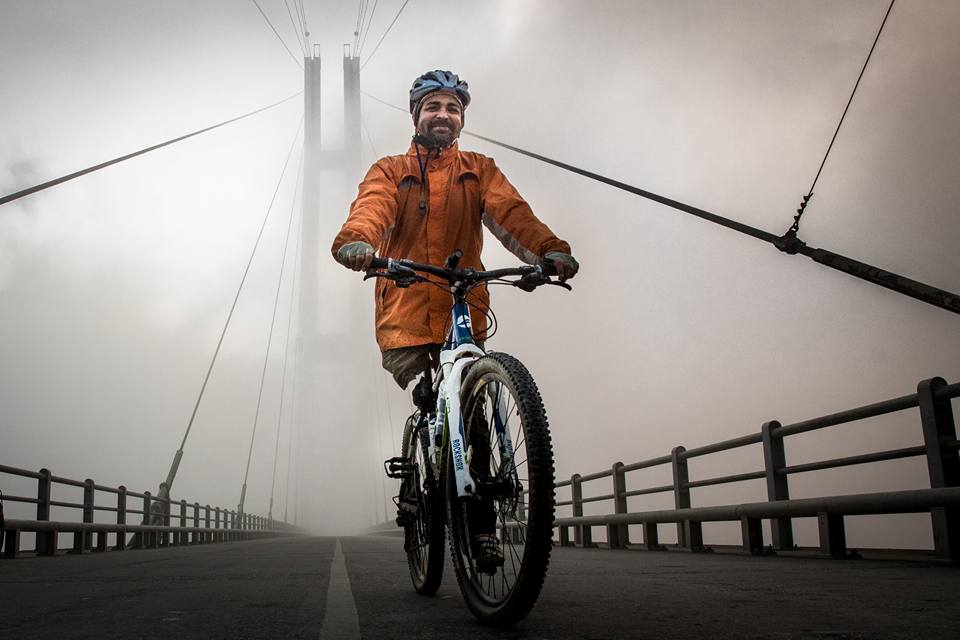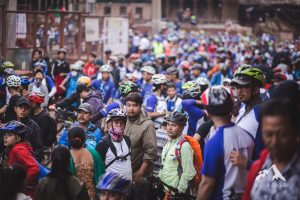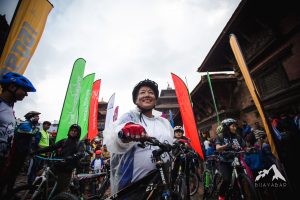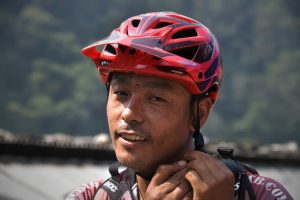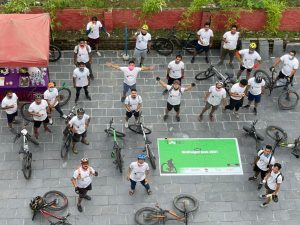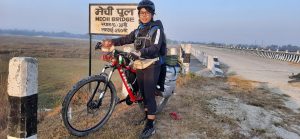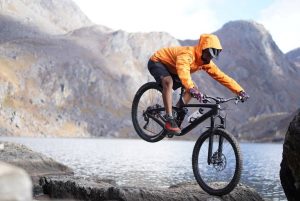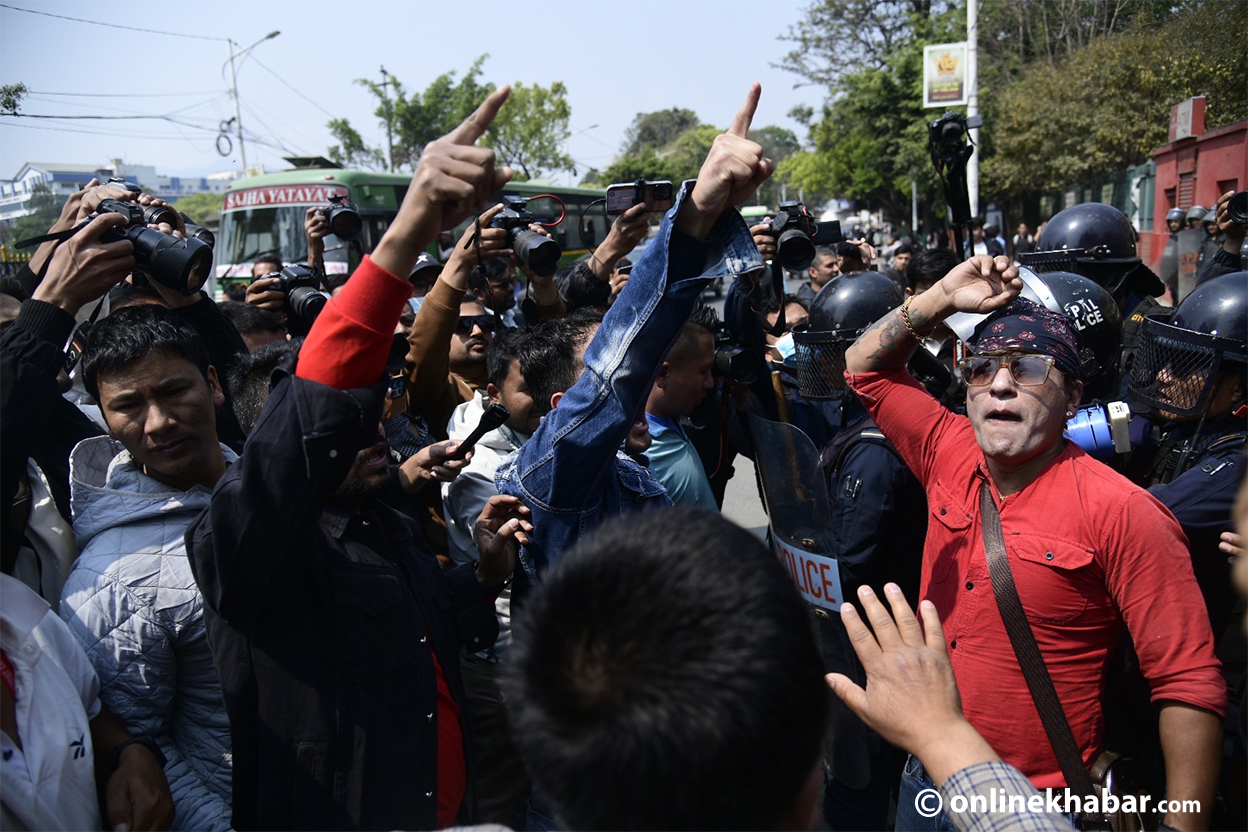In 1997, Yam Lal Rasaily was on a bus returning home to Chaumala from Dhangadhi via Geta, in the Kailali district of Sudurpaschim. As he had left a few belongings in Geta, he requested the bus driver to stop for a bit longer as he wanted to pick them up before he went home. With a crutch in one hand and a bag in the other, he was getting on the bus when suddenly it started to move. As the bus moved, the conductor threw away his possession which was inside the bus and left Rasaily, a single-leg amputee, on the floor.
Rasaily, a Dalit, had always faced discrimination from an early age, but this, he says, was a tipping point. This is why he decided on that day he would give his all and learn how to ride a bicycle and travel independently.
“That is the day I will never forget,” he says. “It taught me a lesson that even if you’re an amputee, you need to be strong because, in this world, no one will speak on your behalf.”
A lot has happened since then. Rasaily has learnt how to ride a cycle and has toured all over Nepal. He has participated in various events in India which includes MTB Arunachal and a rally on India’s Independence day where he rode over 250 kilometres. In 2018, he even reached Rara lake on his bike pedalling through horrendous terrains spreading a message that even differently-abled people like him could live life to the fullest.
Having done all that, now, Rasaily wants to do more as he hopes to represent Nepal at an international para-cycling event. But for that, a lot of things has to go his way, he says.
A day that changed everything
Rasaily was born in the Parbat district in a marginalised community in 1978. By the time he was two, his family relocated to Bhairahawa after facing constant nagging from society for being a Dalit.
“I don’t recall things, but my father says we were treated poorly,” he says.
At Bhairahawa, things were not that different. His father left for India soon after and landed a job in the Indian Army. But, soon his father was back in Nepal because Rasaily suffered from a mysterious leg injury.
It was Laxmi Puja in 1982 and a four-year-old Rasaily was playing deusibhailo with his sibling around the village. He had been out for a few hours and after he passed out, his elder brother took him home around midnight.
“I started to develop an odd pain in my right leg. It started to get unbearable from the hip downwards,” he says.

He was first taken to a shaman who could do nothing and blamed Rasaily for going out and being possessed by an evil spirit. Then, he was taken to a local vaidya (an Ayurvedic chemist) who put a cast over his leg. But, nothing changed.
The leg did not heal. The cast, as a matter of fact, made the pain worse. When he was finally taken to Lumbini Zonal Hospital, his parents were told their son’s right leg had to be amputated as the cast had created an infection.
“When they removed the cast, a part of my skin and the muscle was coming out. I don’t remember much, but the pain was quite unbearable. It is quite sad that I don’t remember standing on two feet.”
He was then taken to Palpa where he got his leg amputated.
“It was a sad day for my parents.”
Costs of amputation and self-found solace
Rasaily losing his feet affected his parents more as everyone started to blame them for his state. His parents were told how their sin in their past life was the reason for Rasaily’s current state.
In school, it was the same. He got teased for being both a Dalit and an amputee. He got hit by his crutches and was asked to sit separately while eating lunch and at times was even refused water when he wanted it.
Tired of this social discrimination, his father decided to relocate again as the family moved to Kailali in 1985. Similar things followed in Kailali too. But, his solace came when he first got on a bike.
His elder brother, who worked as a mechanic, commuted on a cycle. Sometimes, he took Rasaily along with him.
I used to pedal with my left leg, while my brother pedalled with his right,” he says. “I enjoyed it quite a lot. I felt free.”
But, he could not ask his brother to take him every time he wanted to commute somewhere. So, he started to see if he could ride it alone. A stubborn teenager, he dragged the bicycle up a small incline and rode it down. Sometimes, he did well, but most of the times, he fell.
“But, one day, I accidentally figured out something which changed the way I cycled,” he says.
When he was 19, he inadvertently kicked the pedal out of its place. But, that came as a boon as he realised that with one side heavier than the other, the pedal which was lighter would always come up and that made cycling easy for him. And since that day, he never looked back.
Proving self with pedals

That was around the late 90s. Soon, he started to dream about doing more than just commuting with a cycle. He wanted more. Having read about Pushkar Shah’s world tour, he then started to dream about doing a Nepal tour so that people could know that even differently-abled people, when given the chance, could overcome adversaries.
“It was an opportunity I received thanks to Save the Children and Pushkar Ojha, the then lawmaker. I travelled to 31 districts in under three months.”
He continued to travel around with his cycle. As he did, the perception of people who ridiculed or demeaned him started to change. Many started to praise his hard work and determination while most of his haters kept their opinions to themselves.
Rasaily started to become a source of inspiration for many. A tailor by profession, he was either at his shop or on the road pedalling. Wanting to prove people wrong and spread a message to fellow differently-abled people, he kept taking part in various events in Nepal and India. He has been part of Tour de Lumbini, Tour de Pokhara and in 2017, he even went to India for events in Delhi and Arunachal Pradesh.
That gave him the confidence to travel alone to Rara on his bicycle in 2018. The journey was not easy, but slowly and one pedal at a time, he reached Rara.
“It was a dream come true,” he says. “The feeling of reaching the lake travelling through the wilderness was a moment that will forever stay with me.”
A long road ahead
But, now, he wants to do more. One of his aims is to travel to places like Badimalika and the various religious places in the far west. He wants to do so to break age-old stereotypes which state a Dalit will go crazy if s/he goes to places like these.

Apart from that, he wants to become a motivational speaker and aims to reach out to more people like him. However, he knows he needs to work hard on this because he wants to relate to people more.
“I have been to hospitals and various places to speak. But, I am still not that great. I need to work on it more so that I can reach out to more.”
For that to happen, he says, he needs the help of the Para Athletics Association Nepal (PAAN). He has been dreaming of taking part in a paralympic event for a long time, but circumstances have not let him do that. He says that the Para-cycling Association Nepal does not let him take part. He says that the association is there on paper only and apart from a few exhibition events, it hardly does anything to facilitate or support athletes.
“It’s fueled with nepotism and bais,” he says. “When I tell them I want to take part they say there are no events. But, when they are asked by others, they say that there are no athletes in Nepal. This is a sad state.”
He says that being from a marginalised community, he does not even have the influence to get into these teams, and with him ageing, his hopes of taking part are depleting.
“I would have loved to do this. But, sometimes, I feel, having given so much time, it feels useless,” he says. “Maybe I might make it. But, at this point, I feel that like many wannabe para-athletes in Nepal, I will also disappear.”
Photos: Yam Lal Rasaily/Facebook



